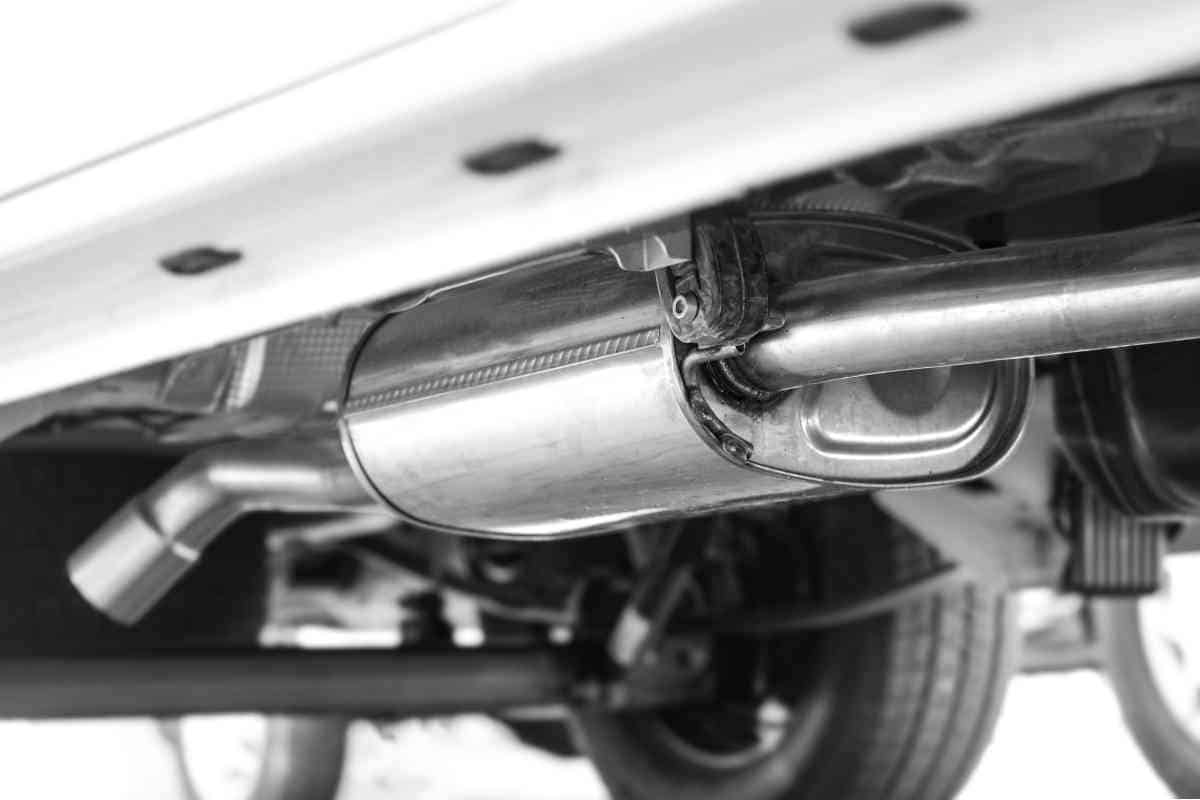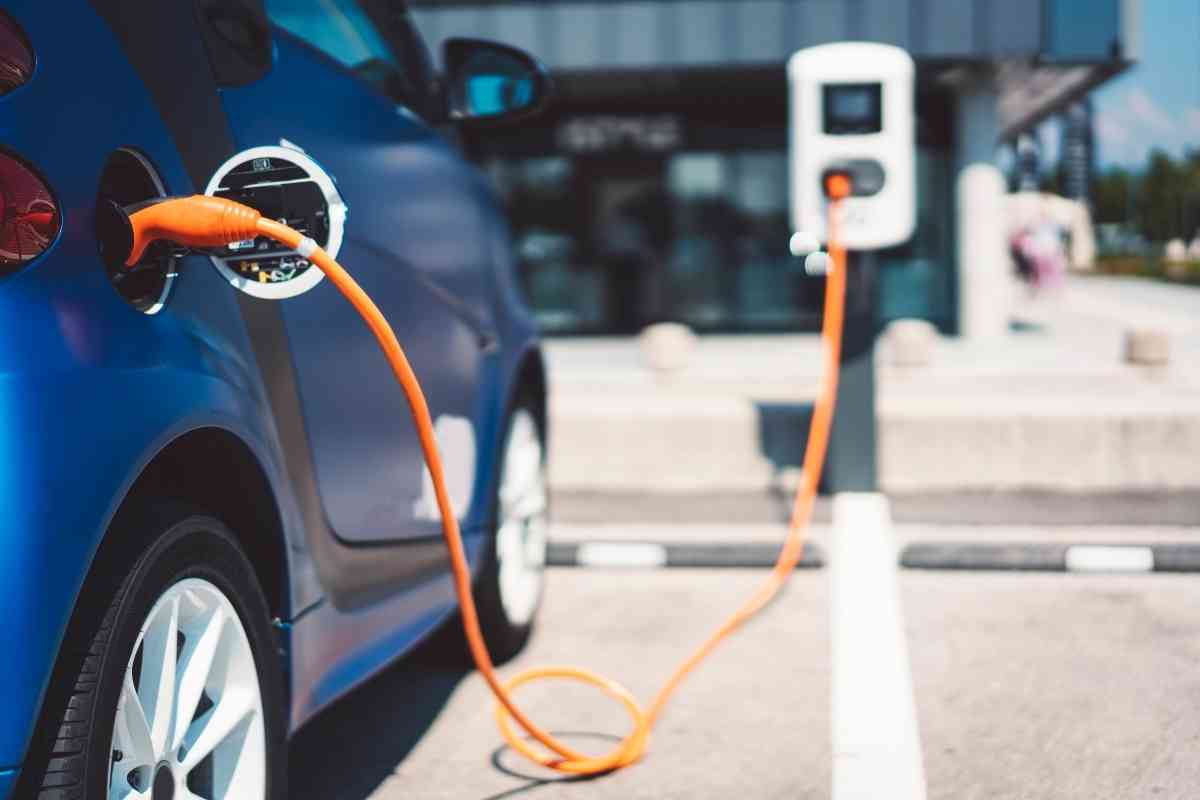does an electric car have a catalytic converter
Catalytic converters are well-known and useful on many types of vehicles, but we ordinarily go asked if electric cars take catalytic converters too.

Table of Contents
- Practise electric cars have catalytic converters?
- Practice Electrical Cars Accept Catalytic Converters?
- Do Teslas Come With Catalytic Converters?
- What Types Of Cars Accept Catalytic Converters?
- Gas And Diesel Cars
- Hybrid Cars
- What Does A Catalytic Converter Do?
- Why Don't Electric Cars Have Catalytic Converters?
- No Exhaust
- No Combustion Engine
- Minimal Harmful Emissions
- Primal Takeaways
Do electric cars have catalytic converters?
Electric cars practice non have catalytic converters considering in that location is no traditional engine, combustion, and frazzle system. They also don't release harmful emissions similar traditional gas-powered vehicles, so the catalytic converter is unnecessary. However, gas or diesel hybrid cars do accept them.
Since the introduction of electrical cars, there has been a lot of debate over whether electric cars have catalytic converters.
We take worked with these cars and researched how and why electrical cars don't take them. Keep reading to learn exactly why.
Do Electrical Cars Have Catalytic Converters?
No, electric cars don't have catalytic converters. The catalytic converter is an emissions control device used on most modern automobiles to reduce air pollution.
They are mainly used in cars that run on gasoline or diesel fuel. They are not used on electric cars considering they don't emit any harmful gasses, and so they don't need a catalytic converter.
Electric cars practice not use a traditional internal combustion engine for fuel, so they practise non emit harmful emissions. This ways no catalytic converter is needed because there is no exhaust.
Hybrid cars and other vehicles that run on gas use a catalytic converter. Information technology's the best way to ensure cars are eliminating the number of harmful emissions into the air.
Catalytic converters work with combustion engines too. The combustion engine will create energy by burning fuel and turning it into heat. The converter makes this a condom fume to emit into the air.
Withal, electric cars don't produce any emissions, to begin with, so there is no demand for a catalytic converter.
Do Teslas Come up With Catalytic Converters?
No, Teslas do non have catalytic converters. This vehicle component is meant to reduce the level of pollutants in exhaust gasses by oxidizing them.
They crave oxygen to function and are incompatible with Teslas which run on an electric engine. There is also no exhaust arrangement in whatever Tesla models.
This is because no Tesla uses gasoline, and then the purpose of a catalytic converter makes no sense with this vehicle. There are minimal harmful emissions produced by this car, and they don't need this component.
The same applies to oil changes when discussing Teslas and other electrical cars. They are not required considering there is no traditional engine, frazzle, and fuel.

What Types Of Cars Have Catalytic Converters?
All cars and trucks congenital later 1974 come with a catalytic converter equipped. This was when the modify from old, lead-based fuel focused on safer vehicle and fuel practices.
However, electric cars are one example of vehicles that don't use catalytic converters. In structure, they besides use rare earth metals similar platinum, palladium, or rhodium, making them a common target for thieves.
So we will explain the types of cars that do have catalytic converters.
Gas And Diesel fuel Cars
All gas and diesel fuel-powered cars congenital afterwards 1974 come with a catalytic converter. This is necessary, peculiarly on older cars, for safety and performance.
The catalytic converter is a device that converts harmful gasses from the car's frazzle into less toxic substances. The catalyst is heated by the exhaust gasses and reacts with oxygen in the air.
Hybrid Cars
It may be surprising to some, but hybrid cars built later 1974 likewise come up with catalytic converters. Both plug-in and non-plug-in hybrids accept them.
This is because these vehicles partially rely on gas or diesel to run, so based on the laws, they must also come up with a catalytic converter. Nevertheless, it gets used less, so thieves target these vehicles more.
What Does A Catalytic Converter Do?
Catalytic converters are automobile devices that help reduce air pollution by converting harmful gasses into less harmful ones.
This is washed by using a catalyst to speed up chemical reactions between nitrogen oxides and hydrocarbons in the exhaust arrangement.
The chief do good of catalytic converters is that they can decrease the level of carbon monoxide pollution and nitrous oxide emissions from vehicles.
It's used to reduce the number of pollutants in a vehicle'southward exhaust. It does this past breaking down the pollutants into smaller particles. These particles are then emitted from the automobile as water vapor and carbon dioxide.
Because of the purpose of a catalytic converter, they are not needed in electric cars. There is no fuel burn or airborne pollutants to worry about.
Why Don't Electric Cars Have Catalytic Converters?
Catalytic converters are often establish in cars that run on gasoline, diesel, or natural gas. They are used to reduce the number of harmful emissions that come up from the vehicle's engine.
No Exhaust
Electrical cars don't take catalytic converters considering in that location is no exhaust or exhaust system with emissions. In a traditional auto, the exhaust pulls these fumes from the engine and cabin and releases them.
Considering these fumes don't exist in an electric auto, there is no demand for a catalytic converter. This is primarily why the new trend and shift towards electrical cars are condign so of import.
No Combustion Engine
The combustion engine in a regular automobile creates energy past burning fuel and turning it into heat. Of class, this creates fumes and unnatural emissions, which can be harmful.
Electric cars don't have an engine like this because they apply advanced batteries instead. Without a combustion engine, the catalytic converter serves no purpose.
Minimal Harmful Emissions
Lastly, minimal harmful emissions are released from an electric car while driving. The purpose of a catalytic converter is to turn these emissions into less harmful fumes.
Without any fumes, there is no reason to equip an electrical motorcar with a catalytic converter.
Fundamental Takeaways
- Electric cars don't have catalytic converters because there is no frazzle arrangement, combustion engine, or harmful emissions.
- Catalytic converters are in all cars and hybrid vehicles that use gas and are built after 1974.
- Tesla vehicles as well don't utilise catalytic converters because the design doesn't emit fumes or use gas.
- The catalytic reduces pollutants by turning harmful emissions from the engine into less harmful gasses released through the exhaust.
Source: https://fourwheeltrends.com/do-electric-cars-have-catalytic-converters/

0 Response to "does an electric car have a catalytic converter"
Post a Comment